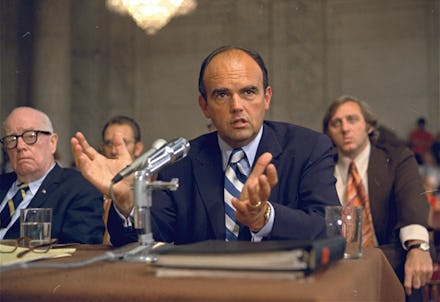The War On Drugs' Horribly Racist Origins Have Finally Been Revealed

A former adviser to President Richard Nixon said the war on drugs was invented to criminalize black people and suppress the radical left, according to an article published by Harper's.
Dan Baum, a Harper's contributor and former staff writer for the New Yorker, recalled a conversation he had in 1994 with former adviser to the president for domestic affairs John Ehrlichman, who served 18 months in federal prison for perjury charges stemming from the Watergate scandal.
Here's Ehrlichman's damning admission to Baum, via Harper's:
At the time, I was writing a book about the politics of drug prohibition. I started to ask Ehrlichman a series of earnest, wonky questions that he impatiently waved away. "You want to know what this was really all about?" he asked with the bluntness of a man who, after public disgrace and a stretch in federal prison, had little left to protect. "The Nixon campaign in 1968, and the Nixon White House after that, had two enemies: the antiwar left and black people. You understand what I'm saying? We knew we couldn't make it illegal to be either against the war or black, but by getting the public to associate the hippies with marijuana and blacks with heroin, and then criminalizing both heavily, we could disrupt those communities. We could arrest their leaders, raid their homes, break up their meetings, and vilify them night after night on the evening news. Did we know we were lying about the drugs? Of course we did."
So there you have it. The online version of Baum's article, "Legalize It All," drove so much traffic on Tuesday it caused the Harper's website to crash temporarily:
John Ehrlichman died in 1999, making it impossible to independently verify this quote with him. If true, however, it doesn't actually reveal much that wasn't already known.
The war on drugs has been wreaking havoc on America's poor communities of color for decades. Since 1971, when Nixon officially declared drugs "public enemy No. 1," a brutal crackdown on narcotics use, possession and distribution has ushered in an era of mass criminalization, which has disproportionately impacted black people.
Over the course of the drug war, possession of substances like crack cocaine, which devastated black neighborhoods in the 1980s, held much harsher penalties than those for cocaine, a similar substance more commonly associated with white users.
In 2010 black people were almost four times as likely to be arrested for marijuana possession as white people, according to the American Civil Liberties Union. Even today in Colorado and Washington — states where recreational marijuana use is now legal — black marijuana arrest rates are still higher than everyone else's.
Michelle Alexander outlined how the drug war was originally designed as a form of social control in her book The New Jim Crow: Mass Incarceration in the Age of Colorblindness. During the 1960s and 1970s, "[as] factories closed, jobs were shipped overseas, deindustrialization and globalization led to depression in inner-city communities nationwide, and crime rates began to rise," Alexander told Frontline.
"And as they rose and the backlash against the civil rights movement reached a fever pitch, the get-tough movement exploded into a zeal for incarceration, and a war on drugs was declared," she explained.
What stands out about Ehrlichman's reported admission is how blunt and straightforward it is. Perhaps now Americans can have a more open conversation around what this "war" has really been about.
h/t Jezebel